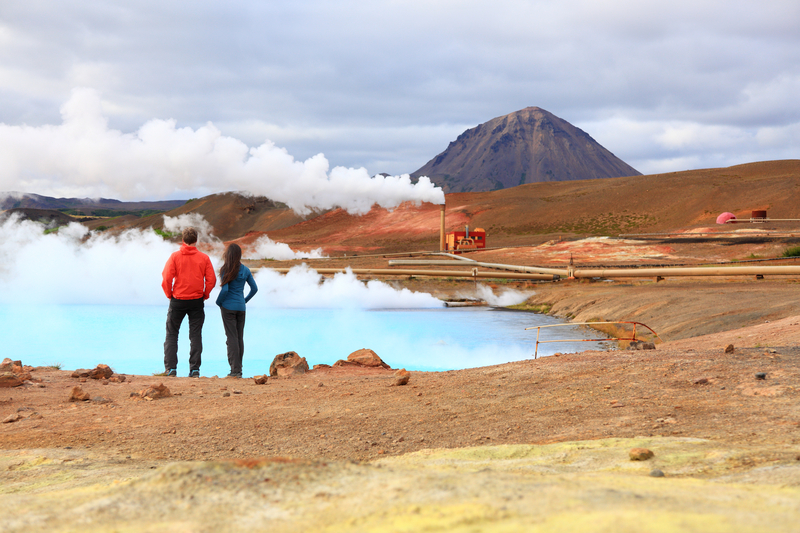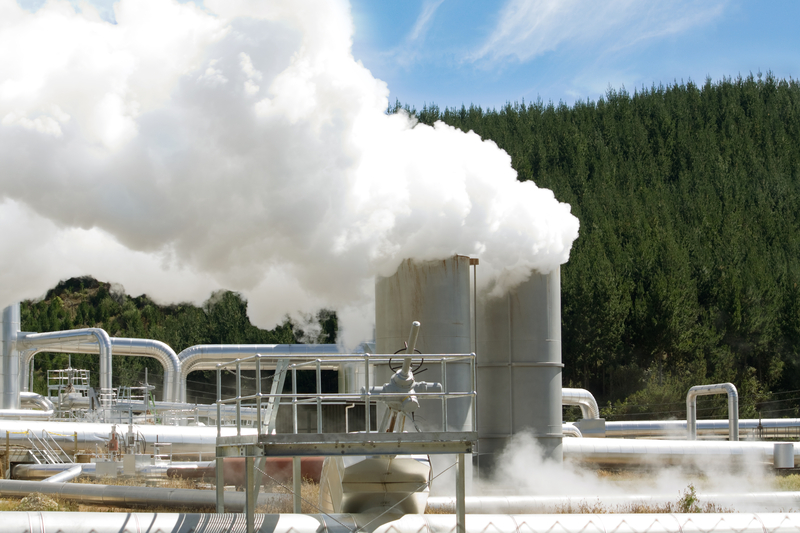This article is your complete guide to answering the question, “Is Geothermal Expensive?” Geothermal energy has a higher upfront price but offers long-term benefits and savings. High-end geothermal energy systems can cost upwards of $45,000 for larger homes, but sometimes as low as $15,000 for smaller homes with less energy needs.
It’s important to remember that the total geothermal heating cost depends on factors such as home size, location, soil conditions, available land, local climate, existing ductwork, and the chosen heat pump. That’s why our guide is going to cover the costs of geothermal energy and everything you need to know when pricing one out!
Here at The Energy Professor, we want to give you the information you need to not only save money on your energy bill but to also become more energy efficient. We hope find this post helpful! And makes it easier for you to know more about appliance energy usage. Be sure to also check out our one-of-a-kind energy savings calculator!
The Energy Professor Electricity Rate Check Tool
Is Geothermal Energy Expensive?

Yes, installing a geothermal system in your home will be expensive. Even the cheapest geothermal systems, with government incentives, will still cost you a few thousand dollars to install. The average lower-cost geothermal system is priced at around $17,000, with the actual average of all geothermal system installations costing around $25,000. High-end geothermal systems on larger homes could potentially cost a homeowner upward of $80,000.
Geothermal heating and cooling systems are known for their cost-effectiveness, offering potential savings on energy bills and long-term benefits compared to traditional HVAC systems.
If you’re like me, those higher costs could drive you away from the installation of geothermal energy. With that being said, the long-term benefits of a geothermal system will save you money over time on your electric bill. That’s why we want to explain all of the costs and benefits involved with geothermal energy so you can decide what is best for your home.
How much does a geothermal heat pump cost?
The cost of geothermal system installation for homeowners typically falls within the range of $8,000 to $25,000 on average. However, it’s important to consider various factors that can influence the final geothermal heat pump cost, such as the size of the geothermal system, the type of loop system, and the specific heat pump chosen. Additionally, local geology, property accessibility, and the choice of installation company can also impact the overall cost of the geothermal system installation. It is recommended to assess these factors and obtain personalized quotes from reputable installers to get a more accurate estimate for your specific circumstances.
Specifically, the different types of systems can change the price significantly for your geothermal energy system.
- Horizontal loop system: $15,000 to $30,000
- Vertical loop system: $25,000 to $40,000
- Open loop system: $10,000 to $30,000
- Closed loop system: $25,000 and $30,000
For the installation of a geothermal heating system, you also have to consider the renovations needed in your home to accommodate it. Such as the ductwork in your home might require rerouting, repairing, or building brand new which could add up to $5000 in costs.
Additionally, retrofitting an existing HVAC system for geothermal installations can have significant cost implications, with expenses varying based on whether the home has existing ductwork and the extent of work needed to convert the system.
Factors Affecting Cost
The cost of a geothermal heat pump system can vary widely based on several key factors. One of the most significant is the size of your home. Larger homes require more extensive systems to effectively manage heating and cooling, which naturally increases the installation cost. For instance, a sprawling estate will need a more robust geothermal heat pump system compared to a modest suburban home.
The type of system you choose also plays a crucial role. Horizontal loop systems, which require more land but are generally less expensive to install, can range from $15,000 to $30,000. Vertical loop systems, which are ideal for properties with limited space but require deeper drilling, can cost between $25,000 and $40,000. Open loop systems, which use groundwater, and closed loop systems, which circulate a refrigerant through buried pipes, also have varying costs.
Location is another critical factor. Homes situated in areas with favorable soil conditions and ample land space may benefit from lower installation costs. Conversely, properties in regions with rocky or hard soil may face higher costs due to the need for more extensive excavation. Additionally, local climate conditions can influence the type of system best suited for your home, further impacting the overall cost.
System Efficiency
When evaluating a geothermal heat pump system, one of the most important metrics to consider is its Energy Efficiency Ratio (EER). The EER measures the efficiency of the system in converting energy into heating or cooling. Geothermal heat pumps boast impressive EER ratings, typically ranging from 15 to 45 or more.
A higher EER rating indicates a more efficient system, which translates to lower operating costs and greater energy savings over time. Some of the most efficient geothermal heat pumps can achieve efficiencies approaching 600%, making them an incredibly cost-effective option for homeowners. This high level of energy efficiency not only reduces your heating and cooling costs but also contributes to a smaller carbon footprint, aligning with sustainable living goals.
Location
The geographical location of your home can significantly impact the installation cost of a geothermal heat pump system. Homes located in areas with favorable soil conditions, such as sandy or loamy soils, and adequate land space for horizontal loop systems, may experience lower installation costs. These conditions make the excavation and installation process more straightforward and less labor-intensive.
On the other hand, homes situated in regions with rocky or hard soil may face higher installation costs. The challenging soil conditions require more extensive excavation and specialized equipment, which can drive up the overall cost. Additionally, the local climate can influence the type of geothermal system that is most effective, further affecting the installation cost. For example, areas with extreme temperatures may require more robust systems to maintain optimal indoor comfort.
Related post: What are the Pros and Cons of Geothermal Energy?
How Much Will a Geothermal System Cost to Operate?

One of the best parts of the costs of geothermal systems is that once they’re installed, you start to see those benefits. Installing a geothermal system typically results in significant savings on heating fuel bills for homeowners, while moderately increasing their electrical bills. This trade-off leads to an overall reduction in monthly energy expenses. It is important to consider the cooling system cost as well, as it impacts the overall energy expenses and potential savings. The extent of the savings will depend on factors such as the type of fuel used by your previous furnace and your specific heating requirements. In many cases, these accumulated savings can amount to thousands of dollars over the lifespan of your geothermal system, making it a cost-effective and financially beneficial investment.
Maintenance
Maintaining a geothermal heat pump system is essential to ensure its optimal performance and longevity. Fortunately, the maintenance costs for these systems are relatively low compared to traditional HVAC systems. Homeowners can expect to pay around $100 to $250 per year for routine maintenance, which typically includes annual inspections and occasional minor repairs.
Regular maintenance helps to identify and address potential issues before they become major problems, ensuring that the system operates efficiently and effectively. This proactive approach not only extends the lifespan of the geothermal heat pump system but also helps to maintain its high energy efficiency, resulting in continued savings on heating and cooling costs.
What is the geothermal heating cost per month?
The operational cost of a properly sized geothermal heating system typically ranges from $100 to $200 per month in electricity expenses. Compared to conventional cooling systems, geothermal systems are more energy-efficient and have lower operational costs. It’s important to note that during extreme temperatures when backup heaters are required to supplement the geothermal system, the average electric bill may increase. Additionally, in cases where geothermal lines freeze, there may be added costs associated with running backup heating systems. These backup heaters can be up to twice as expensive to operate compared to the geothermal system alone. It’s advisable to ensure proper system sizing and maintenance to maximize energy efficiency and minimize potential additional costs.
How much does geothermal energy cost per year?
Geothermal power plants, when running at 90% availability, spend around one to three cents per kilowatt-hour. Even newer power plants that charge a bit higher still only cost around $0.05 per kWh. Experts state that with a geothermal system, you can expect a 30% to 70% reduction in your annual utility bill for heating, and 20% to 50% for cooling. Moreover, a geothermal pump with a desuperheater system can reduce water heating costs by 50%. Ground source heat pumps are particularly cost-effective, offering significant benefits such as lower installation costs over time, increased efficiency, and sustainable heating and cooling solutions. Thus, while the per kWh cost might be slightly higher for geothermal energy, the overall savings in utility bills make it a more cost-effective choice in the long run.
Related post: How Does Geothermal Energy Work?
DIY vs. Professional Installation

Installing a geothermal heat pump system is a complex and challenging task that requires specialized skills and equipment. While some homeowners may consider a DIY approach to save on installation costs, it is generally recommended to hire a professional contractor with experience in geothermal heat pump installation.
Pros and Cons of DIY Installation
Pros:
- Potential cost savings: DIY installation can reduce the upfront costs associated with hiring a professional contractor.
- Ability to customize the installation to specific needs: Homeowners have the flexibility to tailor the installation process to their unique requirements.
Cons:
- Lack of expertise and experience: Installing a geothermal heat pump system requires specialized knowledge and skills that most homeowners do not possess.
- Potential for errors and safety hazards: Mistakes during installation can lead to safety risks and system malfunctions.
- Voiding of manufacturer warranties: Many manufacturers require professional installation to honor their warranties, so DIY installation could void these protections.
- Increased risk of system failure and reduced efficiency: Improper installation can result in a less efficient system and a higher likelihood of breakdowns.
Given these considerations, it is essential to weigh the pros and cons carefully. Hiring a professional contractor ensures a safe, efficient, and cost-effective installation, providing peace of mind and long-term benefits.
Related post: What is Renewable Energy?
Geothermal Costs FAQ

Q: Is geothermal energy expensive to use?
A: The cost of using geothermal energy depends on several factors. While the initial investment for a geothermal system can be higher compared to other heating and cooling options, it offers long-term benefits and savings. Once installed, geothermal systems can lead to significant reductions in heating fuel bills for homeowners, although electrical bills may moderately increase. Overall, geothermal energy can result in lower monthly energy expenses, and the accumulated savings over the lifespan of the system can amount to thousands of dollars.
Q: Is geothermal energy expensive or cheap and why?
A: Geothermal energy can be considered relatively expensive upfront due to the initial installation costs. High-end geothermal systems for larger homes can range from $45,000 to $80,000, while smaller homes with lower energy needs may have systems priced as low as $15,000. However, it’s important to evaluate the long-term benefits and savings that geothermal energy offers. Despite the initial investment, geothermal systems can lead to significant reductions in heating fuel bills, making it a cost-effective choice in the long run.
Q: Why is geothermal power so expensive?
A: The cost of geothermal power is influenced by various factors. One significant factor is the geological location and accessibility of geothermal resources. Areas with easily accessible resources tend to have lower costs compared to regions where resources are less abundant or harder to reach. Additionally, the depth of geothermal resources impacts the cost, as deeper resources require more expensive drilling and infrastructure. The type and size of the geothermal system installed can also affect the cost, with larger and more complex systems generally being more expensive. Other factors include installation costs, ongoing operating and maintenance expenses, government incentives, and broader economic factors such as labor and materials costs.
Q: What is cheaper: solar or geothermal?
A: Both solar and geothermal energy systems have upfront costs associated with installation. Solar panels can be a more accessible option for many homeowners, with costs varying based on system size and quality. Geothermal systems, on the other hand, typically have higher upfront costs due to drilling and infrastructure requirements. However, geothermal systems can offer more consistent energy production and may result in greater long-term savings on heating and cooling expenses. Ultimately, the cost-effectiveness of each option will depend on individual circumstances and local factors.
Do you Need Cheaper Electricity?
If you’ve taken the time to understand the information on your bill and discovered you’re paying more than you’d like for your electricity, have you looked around for a cheaper deal? The Energy Professor has a wealth of information on ways to save on your utilities, including details of top deals that could significantly reduce your monthly or quarterly electricity bills.
We hope you found this article helpful! If you are looking for ways to increase energy efficiency and sustainability in your home be sure to take a look at all of the latest renewable energy options in your area. The Energy Professor helps residential and small business owners find qualified energy suppliers in New York, New Jersey, Pennsylvania, Texas, Ohio, Maryland, Illinois, and Massachusetts

